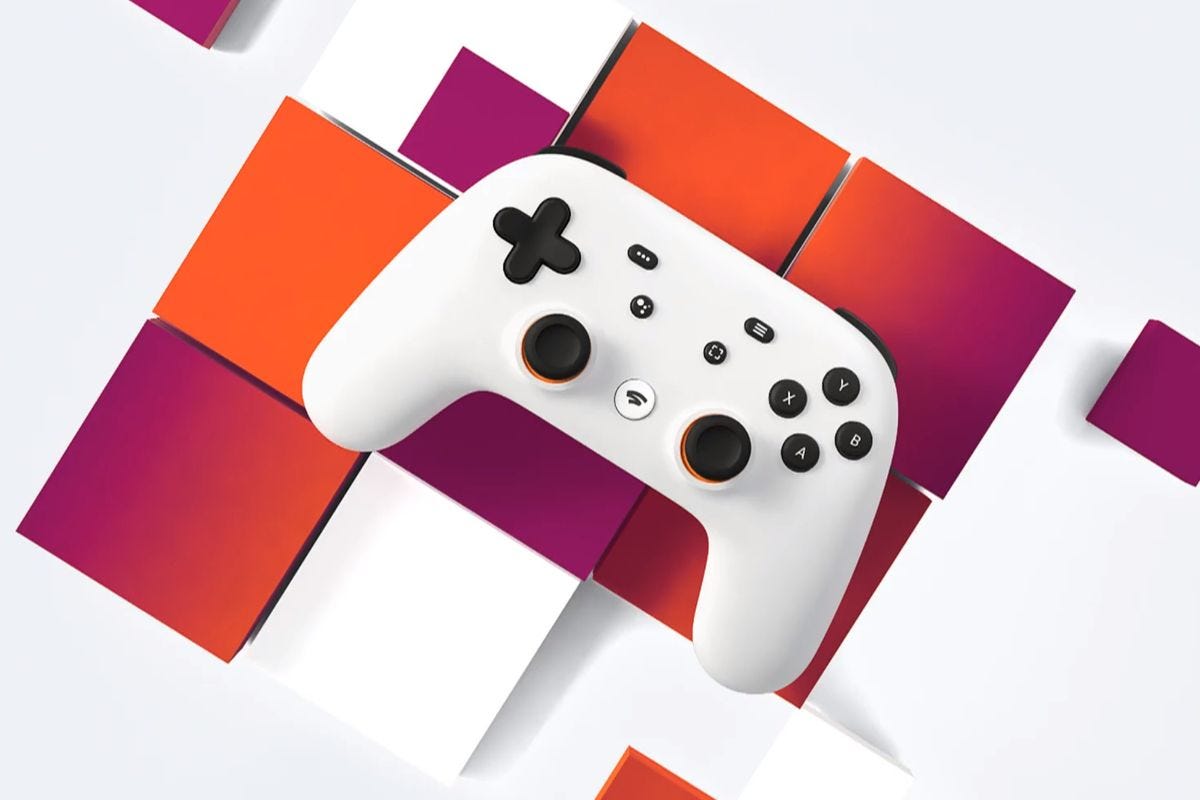
Big tech future breakup plus Google goes gaming with Stadia
Click to read the full story: Big tech future breakup plus Google goes gaming with Stadia
It was only a matter of time before Google decided to throw their hat into the gaming world and more than likely make a big mess before retreating. If they make a mess, they’ll wind up leaving an even bigger one in their wake as they have often done. As with display ads, Google is now under investigation as they’ve bullied website publishers to keep rates low only to find they have now cannibalized themselves.
Google will start its Stadia streaming service to challenge the video game industry in November — but initially only as part of a $130 bundle that includes hardware and a pass for a friend.
Google announced the game service in March with few details. On Thursday, Google said it will start advance sales for the limited “Founder’s Edition” bundles right away, though it isn’t saying how many are available. Google won’t offer stand-alone subscriptions, for $10 a month, until next year.
Stadia is Google’s attempt to make traditional video game consoles such as the Xbox and PlayStation obsolete.
Games are stored online, and players can pick up where they left off on traditional computers with Google’s Chrome browsers and Chromebooks running Chrome OS. Players can also use Google’s Pixel phones, but not other phones with the company’s Android operating system. Unlike traditional games, the streaming service requires a constant internet connection to play.
Much like movies and music, the traditional video game industry has been shifting from physical hardware and games to digital downloads and streaming. The makers of leading consoles have their own subscription services as well, while Apple plans one this fall. The U.S. video game industry raked in revenue of $43.4 billion in 2018, up 18 percent from 2017, according to research firm NPD Group.
Video game streaming typically requires a strong connection and more computing power than simply streaming video, since there is real-time interaction between player and game. Google says it is tapping its massive data centers to power the system.
The service will mainly let players play games they buy separately, though some free games will be offered. Stadia will launch with about 30 games to buy, including “Doom Eternal,” ″Assassin’s Creed Odyssey” and “Wolfenstein: Youngblood.”
The “Founder’s Edition” package includes three months of Stadia and a three-month buddy pass that someone else can use. It’ll come with a limited edition controller and a Chromecast Ultra streaming video device. Google says the whole package is worth about $300 but costs $130. It will be available in 14 countries at launch, including the U.S., Canada, U.K., France and Germany.
Next year, Google will offer Stadia Pro for $10 a month and a free version, Stadia Base. With the free version, resolution will be lower, and players won’t get discount on games offered through Pro and the bundle. An optional Stadia controller will sell for $69.
The Wi-Fi-enabled controller has a button that lets players tap Google Assistant to ask questions about the games being played. Another button lets users share gameplay directly to Google’s video streaming service, YouTube.
Google said playing video games will be as simple as pressing a “Play Now” button. Players won’t have to download or install anything.
Sony offers a PlayStation Now streaming service that’s $20 for a one-month subscription or $45 for three months. It offers unlimited access to 750 games for streaming or downloads, which allow for offline play. Microsoft’s $10-a-month Xbox Game Pass offers about 100 games for free download. Microsoft is also working on a streaming service called Project xCloud.
The upcoming Apple Arcade subscription will feature more than 100 games for download, curated by Apple and exclusive to the service. Apple hasn’t announced a price yet. The games can be played on Apple devices only.
More From Google Stadia
Google announced Baldur’s Gate 3 and Ghost Recon: Breakout for Stadia, the latter with a new trailer. (Don’t worry—the former is also coming to PC.)
Other games announced include Gylt, an adventure game from developer Tequila Works, and a multiplayer Overcooked-style game called Get Packed from Moonshine Studios.
The Division 2 will be there, too. Ubisoft overload!
Stadia Pro is the official service, at $10/month, which will give you access to the service’s games at 4K resolution/60 frames-per-second. This won’t include all the games, though—newer ones will be purchasable separately.
The controller is $70 standalone.
The Stadia Founder’s Edition will launch later this year for $130. It comes with a Chromecast Ultra, a Stadia controller, a copy of Destiny 2 (along with the new Shadowkeep expansion), and a three-month subscription along with a three-month buddy pass.
Other Stadia games include Assassin’s Creed Odyssey, Doom, Doom Eternal, the new Tomb Raider trilogy, Final Fantasy XV, Darksiders Genesis, Metro Exodus, and many others.
Google says it’ll be one user per Stadia account, tied to your Google ID—you can have a guest account for splitscreen, but other than that, no sharing. A Google spokesperson reached out to say that family sharing is coming in the future.)
“At launch, if you’re a Stadia user, you can play Stadia exclusively on Pixel 3 and 3a devices. However, you’ll be able to create your account and make subscription and game purchases from any Android M+ or iOS 11+ device that has access to the Stadia app.”
Is Big Tech headed for a big breakup?
The U.S. Justice Department and the Federal Trade Commission are moving to investigate Google, Facebook, Amazon and Apple over their aggressive business practices, and the House Judiciary Committee has announced an unprecedented antitrust probe , promising “a top-to-bottom review of the market power held by giant tech platforms.”
In addition, at least two 2020 presidential hopefuls have expressed support for breaking up some of technology’s biggest players amid concerns they have become too powerful.
Experts say breakups are unlikely in the short term, and Rep. David Cicilline, the Rhode Island Democrat who leads the subcommittee pursuing the House investigation, called such measures a “last resort.” But even without that, Facebook, Google, Amazon and Apple could face new restrictions on their power.
Google, Facebook, Amazon and Apple declined to comment on the investigations.
Here’s a look at the cases that could be brought against them and what their defenses could be.
FACEBOOK
With 2.4 billion users, $56 billion in revenue last year and a name that’s synonymous with social media, Facebook is certainly big. But is it an illegal, competition-crushing monopoly?
Federal regulators are already investigating the company’s privacy practices. But the antitrust question has been rumbling in the background, with critics calling for spinning off WhatsApp and Instagram. Democratic presidential candidate Elizabeth Warren has called for breaking up Big Tech, as has Chris Hughes, a co-founder of Facebook. Former Vice President Joe Biden has said that he is open to the idea.
Critics believe a breakup is needed because Facebook can squash competitors either by buying them or using its enormous resources to mimic services they offer — as it’s done with Snapchat, for example.
Facebook executives have been calling broadly for regulation, though nothing that comes close to breaking it up. In a recent statement, the company’s vice president of global affairs, Nick Clegg, said Facebook “accepts that with success comes accountability. But you don’t enforce accountability by calling for the breakup of a successful American company.” CEO Mark Zuckerberg has called for “new rules” in four areas: harmful content, election integrity, privacy and data portability.
Facebook has also stressed that it has competitors in messaging and digital communication, including Apple and Google.
New York University law professor Eleanor Fox said that because antitrust law focuses on companies that raise prices too much, and Facebook is free, it will be a tough to break up the business. And Facebook commands less than a quarter of worldwide digital advertising, well behind Google.
Warren, however, has laid out plans for legislation that targets companies with more than $25 billion of annual revenue. It would limit their ability to expand and force parts of their business to operate as separate entities.
GOOGLE
As Google becomes a leading mail provider, search engine and advertising platform, federal regulators are starting to wonder if it needs to be knocked down a bit.
Critics say Google’s dominance in search has allowed it to squash rivals — notably because Google can show its own products above competitors’ or feature its own ads prominently.
Google might argue it doesn’t have an obligation to do business with its rivals at all — an argument that other companies have made when faced with similar challenges, said Sandeep Vaheesan, legal director for Open Markets Institute, which advocates breaking up monopolies.
It’s Google’s technology and Google can use it as it wishes, goes one line of reasoning.
Google has also faced scrutiny over the practices it uses to get its search and other products featured on smartphones. Some say Google imposes too many self-serving regulations on smartphone makers who use Google’s Android operating system.
But Google might simply argue that Android users like Google products and want them on their phones.
Under existing laws, it is difficult to make the case that Google has monopoly power, “even though I think a lot of people think it’s really obvious,” Fox said.
APPLE
Since its opening in 2008, Apple’s pioneering app store has given customers instant access to services that entertain, enlighten and engage. But it’s also a place where Apple controls all the access and sets commission rates for subscriptions and other purchases made through the apps.
If it opens an investigation, the Justice Department is most likely to focus on whether Apple is abusing its veto and pricing power to throttle and gouge its competition. The commissions it collects are also the subject of a consumer lawsuit that the Supreme Court recently cleared to proceed.
App makers periodically allege that they are blocked because Apple wants people to use its own services. In a recent example, several makers of apps for managing the amount of time kids can use their iPhones say they were kicked out of the store not long after Apple introduced its own screen-management controls.
Apple says it typically blocks only apps with buggy software or features that invade users’ privacy. The company likens its rules to merchants deciding what products to carry. Apple also says its store includes apps that compete with its own products, including Google Maps and Google’s Chrome browser.
Also under criticism is the 30 percent cut that Apple pockets on new subscription sign-ups during the first year and a 15 percent slice for renewals. The app store is expected to generate about $16 billion in revenue this year.
Apple says the commissions cover costs for running the app store, including hiring people to review apps.
Antitrust regulators could try to impose requirements that lower Apple’s commissions or, in a worst-case scenario, force it to spin off the app store. The latter option, though, could hurt consumers by making iPhones and other Apple products more cumbersome to use.
Wedbush Securities analyst Daniel Ives likened a breakup to “a complex and almost impossible Siamese twin operation.”
AMAZON
From an online bookseller, Amazon has grown into a gigantic e-commerce player with its tentacles in everything from web hosting to streaming video to groceries.
The European Union’s antitrust chief has been conducting an early-stage probe into whether Amazon is using data to gain an edge on third-party merchants, who are both its customers and rivals. Italy has been looking into whether Amazon abused its dominance by offering preferential treatment to companies that used Amazon’s own delivery-management services.
Cicilline, the congressman, said Amazon has identified bestselling products elsewhere, rolled out replicas under its own brand and then steered customers to its own products over those of its rivals.
When Warren tweeted in April that big tech companies like Amazon should be broken up, Amazon tweeted back: “Walmart is much larger.”
Amazon CEO and founder Jeff Bezos made a similar case in a recent letter to shareholders: “Amazon today remains a small player in global retail. We represent a low single-digit percentage of the retail market, and there are much larger retailers in every country where we operate. And that’s largely because nearly 90% of retail remains offline, in brick and mortar stores.”
But Amazon does dominate online. Market research company eMarketer expects Amazon to account for 52% of all online sales in the U.S. this year, up from 48% last year.
The post Big tech future breakup plus Google goes gaming with Stadia appeared first on Movie TV Tech Geeks News By: Jeffrey Lang









